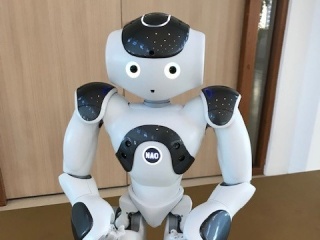Research group Digital Life tackles learning disadvantages with social robotics
11-10-2021

In times of corona, children of Dutch primary schools have fallen behind in their learning due to home education. Digital Life, a research group at the AUAS FDMCI Knowledge Center, has been investigating since October 2021 how the use of robots contributes to solving the learning delay. The research focuses primarily on mathematics education.
'All pupils in primary education have a demonstrable learning delay due to corona.' This was the headline of the Algemeen Dagblad of May 21. this year.
A clear reason for the Digital Life research group of the AUAS to join the research consortium of the SOROCOVA project: 'Social Robotics in support of COVID-19 Learning Disabilities'. The starting point of this research is to remedy their recent learning delay in math education for all primary school students throughout the Netherlands.
A ROBOT THAT IS SOCIAL?
A social robot is a robot that can perform certain non-physical tasks for you using technologies such as speech recognition, facial recognition and emotion recognition.
The aim of SOROCOVA is to build on (further) developing social robotics as a learning tool to support teachers and students in the upper years, namely group 6 of primary education.
Curious how such a social robot works in math education? Then watch this video that was recorded during the Kick-Off.
READY ….? GO!
On October 8, the Kick-Off meeting took place at the Amsterdam University of Applied Sciences, where all the consortium partners involved gave the official go-ahead for the collaboration. Lector Somaya Ben Allouch, the project leader from Digital Life, says: 'We are pleased that we can play a role in this current social problem in the field of education based on our knowledge and expertise in applied research in social robotics'.
MIND YOU
During the Kick-Off meeting, a number of points for attention were discussed that are important to take into account in the coming two years:
- To what extent can we demonstrate that the use of social robotics in education is effective?
- How do you ensure that the interaction between a robot and primary school student is not fun once, but works and motivates for a long time?
- In what way can you motivate teachers - often with a fear of digitization - to use social robotics in their teaching programme?
WHO PARTICIPATE?
In addition to the Amsterdam University of Applied Sciences, the Vrije Universiteit Amsterdam, University of Amsterdam and Utrecht University of Applied Sciences are involved in the research from a scientific perspective. In addition, the municipality of Amsterdam and Diemen are affiliated. And of course various schools in the region, which fall under the Florente Primary Schools Foundation. Last but not least, Interactive Robotics is participating: a startup related to social robotics in education, which plays a crucial role when it comes to the actual application for students with learning disabilities.
In any case, Digital Life is ready to ensure that all students in primary education can make up for their demonstrable learning delay due to corona from now on!

